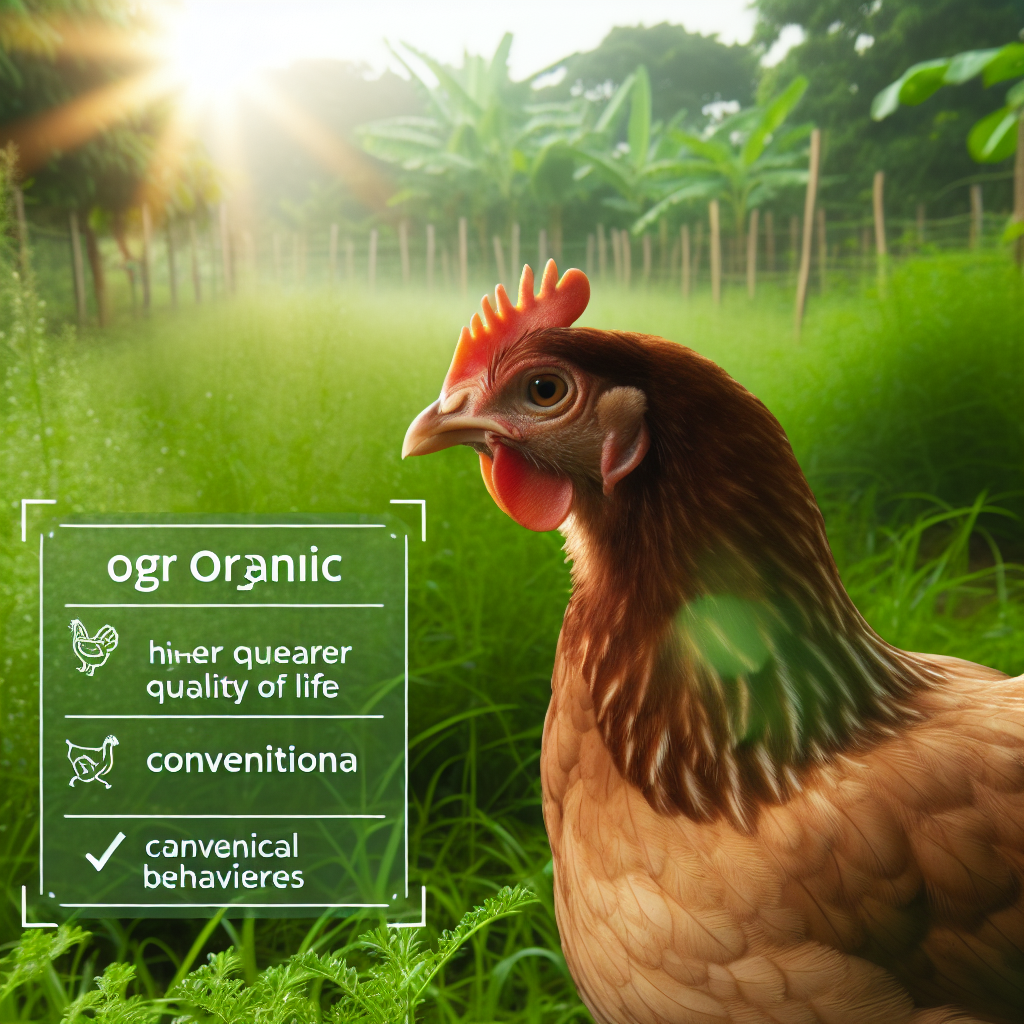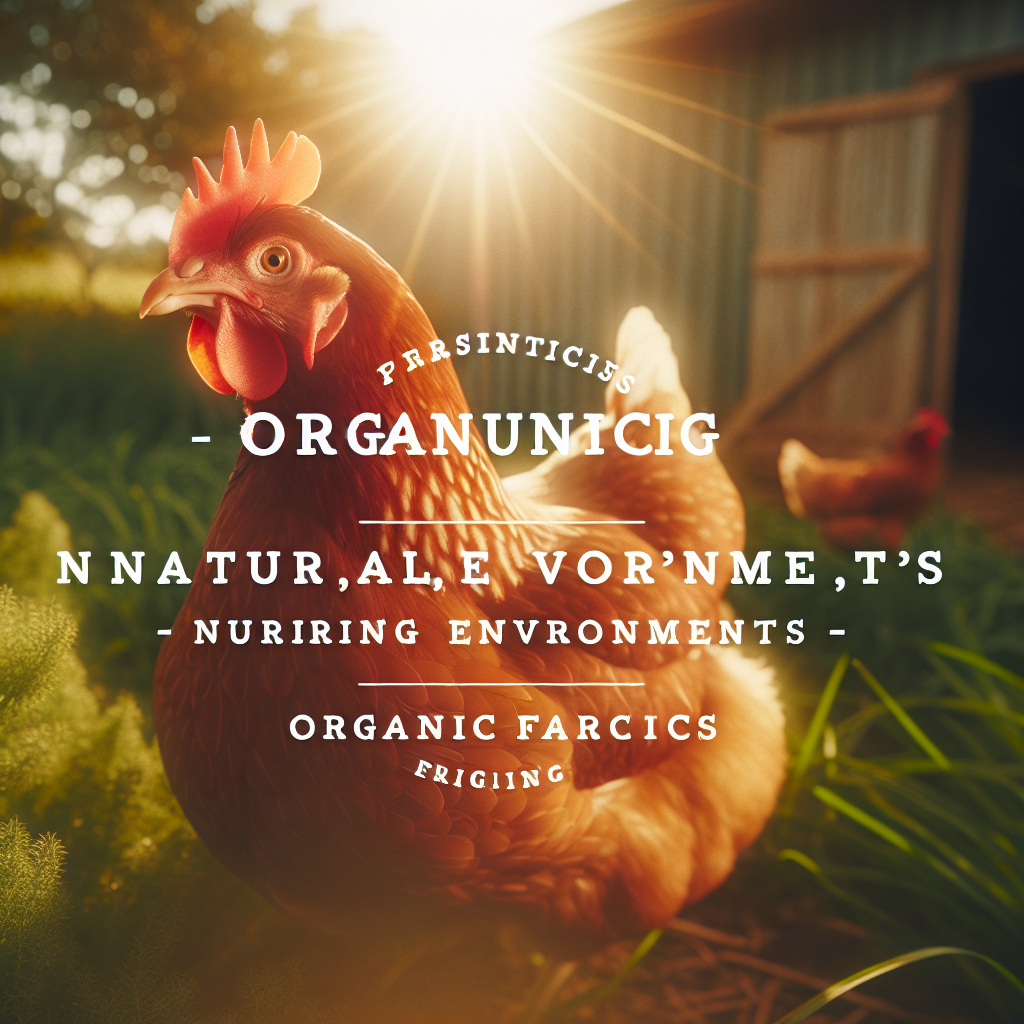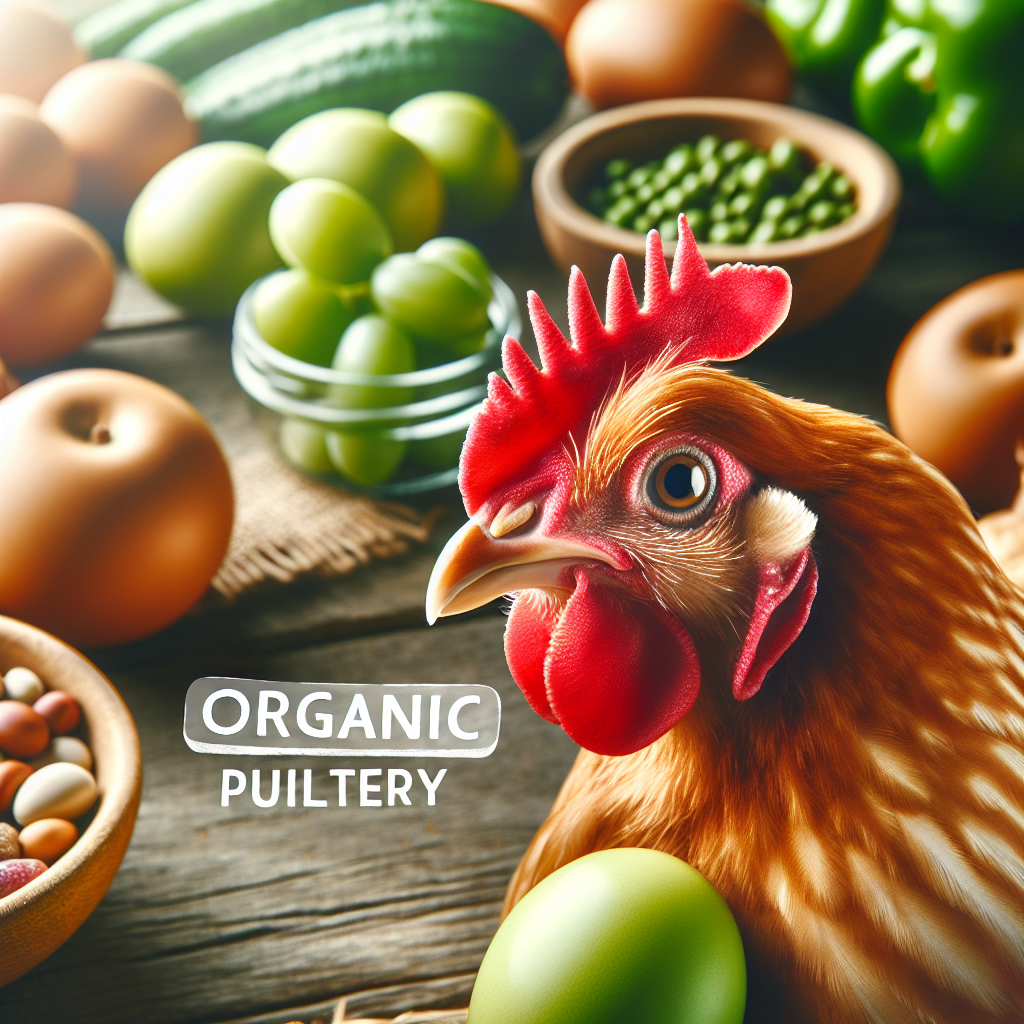Have you ever wondered about the environmental impacts or benefits of organic chicken farming? Well, look no further! In this article, we will explore the various ways in which organic chicken farming can positively affect the environment. From reducing pollution to promoting biodiversity, organic chicken farming holds great potential for a more sustainable and eco-friendly future. So, let’s dive in and discover the fascinating world of organic chicken farming!
Reduced Environmental Pollution
Elimination of synthetic chemicals
One of the key benefits of organic chicken farming is the elimination of synthetic chemicals in the production process. This means avoiding the use of synthetic pesticides, herbicides, and fertilizers that can have detrimental effects on the environment. By opting for organic farming methods, you are reducing the overall pollution caused by these chemicals and their impact on ecosystems.
Reduced air pollution
Organic chicken farming also contributes to the reduction of air pollution. Traditional farming practices often involve the use of fossil fuel-based machinery, such as tractors and harvesters, which emit greenhouse gases and contribute to air pollution. Organic farming methods prioritize the use of manual labor and less-intensive machinery, reducing the reliance on fossil fuels and minimizing air pollution.
Decreased water pollution
Another significant environmental impact of organic chicken farming is the decreased water pollution. Conventional farming often involves the use of synthetic fertilizers and pesticides, which can leach into nearby water bodies, contaminating them and harming aquatic ecosystems. Organic farming practices, on the other hand, emphasize the use of natural fertilizers and biological pest control methods, minimizing the risk of water pollution and promoting healthier aquatic habitats.
Conservation of Natural Resources
Preservation of soil health
Organic chicken farming plays a crucial role in preserving soil health. Conventional farming methods, such as intensive chemical use and monocropping, can deplete soil nutrients and degrade its structure. In contrast, organic farming practices prioritize soil conservation techniques like crop rotation, cover cropping, and composting. These practices enhance the soil’s fertility, structure, and moisture retention, ensuring its long-term sustainability and preventing soil erosion.
Protection of water resources
By adopting organic chicken farming practices, you contribute to the protection of water resources. Conventional farming often requires large amounts of water for irrigation purposes, leading to over-extraction from natural water bodies and depleting water resources. Organic farming, on the other hand, focuses on efficient water management techniques like drip irrigation and rainwater harvesting, minimizing water waste and ensuring the availability of water for future generations.
Sustainable use of energy
Organic chicken farming promotes sustainable energy use in agricultural practices. Traditional farming methods heavily rely on non-renewable energy sources, such as fossil fuels, for various activities like irrigation, transportation, and processing. Organic farming, in contrast, encourages sustainable energy practices such as using solar panels for electricity, utilizing renewable energy sources for heating, and minimizing energy-intensive processes. This reduces the carbon footprint of the farming operations and contributes to a more sustainable energy future.
Biodiversity Protection
Preserving wildlife habitats
One of the significant benefits of organic chicken farming is its positive impact on preserving wildlife habitats. Conventional farming methods often involve the destruction of natural habitats through land clearing and the use of chemical pesticides. Organic farming practices, on the other hand, prioritize the protection and preservation of wildlife habitats by avoiding harmful chemicals, preserving natural vegetation, and maintaining biodiversity. This creates a more balanced ecosystem that supports a wide range of wildlife species, contributing to overall biodiversity conservation.
Supporting pollinators
Organic chicken farming also supports pollinators, which are vital for the reproduction of plants and the maintenance of biodiversity. Unlike conventional farming methods that use synthetic pesticides, organic farming practices avoid the use of harmful chemicals that can harm or kill pollinators like bees, butterflies, and birds. By providing a safe and conducive environment for pollinators, organic chicken farming helps ensure the pollination of crops and wild plants, supporting the overall health and diversity of our ecosystems.
Preventing genetic erosion
Organic farming plays a critical role in preventing genetic erosion, which refers to the loss of genetic diversity in crops and livestock breeds. Conventional farming practices often prioritize high-yielding varieties and breeds, leading to the neglect and loss of traditional and locally adapted varieties. Organic chicken farming, on the other hand, encourages the maintenance and promotion of diverse chicken breeds, which helps preserve genetic diversity and supports the resilience of our agricultural systems.
Enhanced Animal Welfare
Access to outdoor areas
One of the key aspects of organic chicken farming is providing chickens with access to outdoor areas. Unlike conventional practices that confine chickens in crowded indoor spaces, organic farming emphasizes the importance of providing chickens with ample space and outdoor access. This allows them to engage in natural behaviors, roam freely, and have exposure to fresh air, sunlight, and natural surroundings. By ensuring better living conditions for the chickens, organic farming promotes enhanced animal welfare.
Reduced antibiotic use
Organic chicken farming significantly reduces the use of antibiotics in the poultry production process. Conventional farming often relies heavily on the routine use of antibiotics to promote growth and prevent disease outbreaks in overcrowded and unsanitary conditions. Organic farming, however, prohibits the routine use of antibiotics and emphasizes preventive measures like good hygiene, proper nutrition, and appropriate husbandry practices. This reduces the risk of antibiotic resistance, promotes healthier chickens, and contributes to public health by minimizing the presence of antibiotic residues in the food chain.
Better living conditions
Organic chicken farming prioritizes providing better living conditions for the chickens throughout their lives. This includes ensuring adequate space for movement, natural light, ventilation, and appropriate temperature control. These favorable living conditions promote the overall well-being of the chickens, reduce stress, and contribute to healthier and happier animals. By opting for organic chicken products, you can be confident that the animals have been raised in more humane conditions.
Improved Food Quality
Lower pesticide residues
One of the notable benefits of organic chicken farming is the lower presence of pesticide residues in the final products. Conventional farming practices often involve the use of synthetic pesticides, which can leave residues on crops and in animal products. Organic farming, on the other hand, avoids the use of synthetic pesticides, reducing the potential exposure to pesticide residues in the food chain. This is particularly important for consumers who prioritize pesticide-free and chemical-free food options for themselves and their families.
Enhanced nutritional value
Organic chicken farming is associated with enhanced nutritional value in chicken products. Research has shown that organic chicken tends to have higher levels of beneficial nutrients such as omega-3 fatty acids, vitamins, and minerals compared to conventionally raised chicken. This can be attributed to the organic farming practices that prioritize soil health and biodiversity, resulting in healthier crops and a more nutrient-rich feed for the chickens. By choosing organic chicken, you can ensure that you are consuming food with enhanced nutritional value.
Reduced risk of antibiotic resistance
By consuming organic chicken products, you contribute to the reduced risk of antibiotic resistance. Conventional farming practices often involve the routine use of antibiotics in the poultry production process, which can contribute to the development of antibiotic-resistant bacteria. Organic farming, on the other hand, prohibits the routine use of antibiotics, minimizing the risk of antibiotic-resistant bacteria in the food chain. This is particularly important in mitigating the global threat of antibiotic resistance and ensuring the effectiveness of antibiotics for human and animal health.
Promotion of Sustainable Farming Practices
Crop rotation and diversification
Organic chicken farming promotes sustainable farming practices such as crop rotation and diversification. Crop rotation involves the systematic rotation of crops on a piece of land over different seasons or years. This practice helps maintain soil health, reduces the risk of pests and diseases, and improves nutrient availability. Organic farming also encourages crop diversification, which involves growing multiple crops in the same area. This promotes biodiversity, reduces pest pressure, and enhances soil fertility. By adopting these practices, organic chicken farming contributes to long-term sustainability and resilience in agriculture.
Composting and nutrient recycling
Organic chicken farming emphasizes the use of composting and nutrient recycling as sustainable farming practices. Composting involves the decomposition of organic materials, such as chicken manure and plant waste, to produce nutrient-rich compost that can be used as natural fertilizer. This reduces reliance on synthetic fertilizers and promotes the recycling of organic waste, closing the nutrient loop and minimizing waste generation. By utilizing composting and nutrient recycling, organic chicken farming reduces the environmental impact associated with nutrient runoff and pollution while ensuring the long-term fertility of the soil.
Ecosystem-based pest management
Organic chicken farming utilizes ecosystem-based pest management strategies for pest control. Instead of relying on synthetic pesticides, organic farming practices focus on maintaining a balance between pests, natural predators, and beneficial insects. This involves creating habitats for beneficial insects, such as ladybugs and lacewings, that can control pest populations naturally. By adopting these ecosystem-based pest management strategies, organic chicken farming reduces the reliance on chemical pesticides, minimizes harm to beneficial insects, and supports a healthier and more resilient ecosystem.
Reduction of Greenhouse Gas Emissions
Mitigation of methane emissions
Organic chicken farming contributes to the reduction of greenhouse gas emissions, specifically methane emissions. Methane is a potent greenhouse gas that contributes to global warming and climate change. Conventional farming practices, particularly in intensive animal agriculture, can result in significant methane emissions from the decomposition of manure. Organic farming, on the other hand, emphasizes the proper management of manure through practices like composting, which reduces methane emissions and promotes the use of manure as a valuable resource for soil fertility.
Lower carbon footprint
Another important aspect of organic chicken farming is the lower carbon footprint compared to conventional farming methods. Conventional agriculture relies heavily on fossil fuels for various activities like machinery operation, transportation, and synthetic fertilizer production. Organic farming, in contrast, prioritizes energy-efficient practices, minimizes the use of fossil fuels, and promotes renewable energy sources. By adopting organic chicken farming practices, you are actively contributing to the reduction of greenhouse gas emissions and combating climate change.
Preserving carbon sinks
Organic chicken farming plays a role in preserving carbon sinks, which are natural systems that store and absorb carbon dioxide from the atmosphere. Forests and healthy soils are important carbon sinks, and the preservation of these ecosystems is crucial for mitigating climate change. Organic farming practices focus on promoting soil health, which enhances the soil’s capacity to store carbon. Additionally, organic farmers often integrate agroforestry practices, such as planting trees on the farm, which further contributes to carbon sequestration. By choosing organic chicken products, you support farming practices that help preserve and enhance carbon sinks.
Protection of Human Health
Reduced exposure to harmful chemicals
One of the significant benefits of organic chicken farming is the reduced exposure to harmful chemicals for both farmers and consumers. Conventional farming methods involve the use of synthetic pesticides, herbicides, and fertilizers, which can have negative health effects when people come into contact with these chemicals. Organic farming practices prioritize the use of natural and organic inputs, minimizing the exposure to potentially harmful chemicals. By choosing organic chicken products, you can reduce your risk of exposure to these chemicals and support a healthier environment for farmers and consumers alike.
Decreased risk of antibiotic resistance
Organic chicken farming contributes to the decreased risk of antibiotic resistance, which is a growing global health concern. Conventional farming often relies on the routine use of antibiotics to prevent disease outbreaks in overcrowded and unsanitary conditions. This overuse of antibiotics can lead to the development of antibiotic-resistant bacteria, which can pose a threat to human and animal health. Organic farming practices, on the other hand, prohibit the routine use of antibiotics, minimizing the risk of antibiotic-resistant bacteria in the food chain. By consuming organic chicken products, you play a part in promoting responsible antibiotic use and protecting human health.
Minimized occupational hazards
Organic farming practices prioritize the health and safety of farmers and farmworkers by minimizing occupational hazards. Conventional farming methods often involve the use of synthetic pesticides and herbicides, which can pose significant risks to the health of those handling these chemicals. Organic farming, however, avoids the use of such chemicals, reducing the potential occupational hazards for farmers. By supporting organic chicken farming, you contribute to creating safer working environments for farmers and farmworkers, promoting their overall well-being and health.
Support for Local Economies
Job creation
Organic chicken farming can contribute to job creation and support local economies. Organic farming practices often require more manual labor and less reliance on machinery, creating employment opportunities in rural communities. Additionally, the demand for organic chicken products provides market opportunities for local farmers, processors, distributors, and retailers. By choosing organic chicken and supporting local agricultural systems, you help generate jobs and stimulate economic growth within your community.
Preservation of traditional farming practices
Organic chicken farming promotes the preservation of traditional farming practices. Traditional farming methods are often deeply rooted in local culture, knowledge, and sustainable practices that have been passed down through generations. Conventional farming, with its focus on intensive industrial practices, can lead to the erosion of these traditional farming systems. Organic farming, on the other hand, embraces and values traditional knowledge, supporting the continuation of sustainable farming practices. By supporting organic chicken farming, you contribute to the preservation of traditional farming methods and the promotion of cultural heritage.
Profitability for small-scale farmers
Organic chicken farming can be financially beneficial for small-scale farmers. Conventional farming often requires significant investments in synthetic inputs, machinery, and infrastructure, which can be challenging for small-scale farmers with limited resources. Organic farming practices, which prioritize natural and organic inputs, can offer more financially sustainable alternatives for small-scale farmers. Organic products often command premium prices in the market, providing small-scale farmers with better opportunities for profitability. By supporting organic chicken farming, you help create a more inclusive and economically viable agricultural sector.
Building Consumer Trust
Transparent and accountable practices
One of the key pillars of organic chicken farming is the promotion of transparent and accountable practices. Organic farmers are required to follow strict guidelines and standards to maintain their organic certification. These standards cover various aspects, including soil health, animal welfare, and pest management. The certification process involves third-party inspections and audits, ensuring compliance with these standards and providing consumers with confidence in the organic products they purchase. By choosing organic chicken, you can trust that the farming practices have been held to high standards of transparency and accountability.
Assurance of organic standards
Organic chicken farming provides assurance of organic standards to consumers. Organic certification ensures that the chickens have been raised in accordance with recognized organic standards, which prohibit the use of synthetic chemicals, routine antibiotics, and confinement in crowded spaces. This certification provides transparency and assurance that the organic chickens have been produced following a set of strict guidelines that prioritize environmental sustainability, animal welfare, and consumer health. By opting for organic chicken products, you can have confidence in the organic standards that have been adhered to throughout the farming process.
Establishing a sustainable food system
Organic chicken farming plays a vital role in establishing a sustainable food system. This encompasses the integration of ecological, social, and economic considerations in the production, processing, and consumption of food. Organic farming practices prioritize environmental sustainability, animal welfare, and human health, contributing to a more sustainable and resilient food system. By supporting organic chicken farming, you actively participate in building a food system that is better for the environment, promotes sustainable livelihoods, and provides healthier food choices for present and future generations.
In conclusion, organic chicken farming offers numerous environmental benefits, including reduced pollution, conservation of natural resources, protection of biodiversity, enhanced animal welfare, improved food quality, promotion of sustainable farming practices, reduction of greenhouse gas emissions, protection of human health, support for local economies, and building consumer trust. By choosing organic chicken products, you contribute to a more sustainable and environmentally-friendly agricultural system that prioritizes the well-being of animals, ecosystems, and humans.




